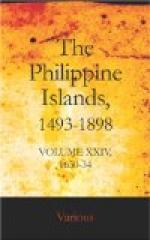While Father Baraona was prior of Salog, he had come from Dumangas, and was returning to his convent. He did not cross in the open, but went slowly along the coast. When they reached a beach, his crew stopped to eat, but he meanwhile walked inland. He had a dog which went before, and, following it, the father found that it had laid hold of a boar, which had tusks one palmo long, and which was as large as a yearling heifer. It was so furious that it had beaten down the reeds as a number of mares thresh out the corn. No sooner did it see the father than it attacked him. The father gave it a slight lance-thrust in the skin, but the point, turning, entered no farther than the very outside. The dog remained true, and held the boar by one leg; but the boar did not discontinue to strike at the father with great fury. But the blows that it thus gave him were received in his habit, which he endured until the arrival of the Indians, with whose aid they killed that savage animal. Brother Fray Andres Garcia assured me that he had never seen anything so terrible looking in Espana, Italia, or any place. Many other things happened to the father, which might make a long history, but do not apply to the matter in hand.
He was much loved by the Indians, for he rendered free and open aid to them, so far as he was able.
CHAPTER XXXVIII
Of the election of our father Fray Juan Enriquez
Our father Fray Alonso de Baraona, in the course of his government, as a person who so well understood the province and its members, thought that no one was better fitted to govern it than our father Fray Juan Enriquez, then the senior definitor. Concerning him, I have not said much of what was seen, and the troubles which he suffered, on the occasion of the unhappy death of our father Fray Vicente. We were made to see how unjust that was, for our Lord freed him from those annoyances with so much honor, by making him provincial, to the applause and pleasure of all; and he was elected May 7, 1620. The father master, Fray Pedro Garcia, presided over this chapter, as he had letters-patent for that from our most reverend father-general, which the archbishop brought, together with his title as master, when he came from Espana to these islands. He was received in the province




